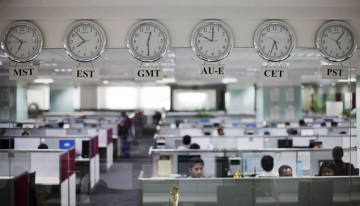 Despite the best efforts of IT teams, suppliers and vendors the average UK worker still loses a day a month due to technology issues.
Despite the best efforts of IT teams, suppliers and vendors the average UK worker still loses a day a month due to technology issues.
New research released today from Managed 24/7 reports how poor IT affects the UK’s workforce productivity.
The report said that it is widely accepted that the UK is facing a productivity crisis and this report outlines, for the first time, how much of this loss is caused by poor IT systems and infrastructure.
The report suggests that IT failure could cost the UK £35 billion per year if the average amount of time lost was applied to all full-time workers, the equivalent of the entire population of Birmingham and Milton Keynes not working all year.
The average GB employee in the private sector who uses IT and has wasted any time, wastes on average 5.59 percent of their total working time due to IT issues. This equates to 27 minutes per day, 2.5 hours per week or more than one working day per four-week month.
In addition to the underlying costs in term of productivity and the bottom line, the report also found that among employees who use IT at work:
More than 32 percent believe that their workplace IT systems are damaging their ability to do a good job, which rises to 37 percent for firms with more than 500 employees
Another 44 percent believe that IT problems directly costs their business time and money
More than 40 percent felt that they had better IT systems at home than at work
Another 24 percent who have experienced IT issues said they have caused customers to complain, rising to 30 percent in firms with 500 or more employees
John Pepper, CEO and Founder of Managed 24/7, said: “The UK is facing a productivity crisis. The UK currently ranks seventh in the G7 and 17th in the G20 for productivity per person, and fixing our outdated and poorly managed IT systems and infrastructure will play a significant role in closing this gap.
“It takes a German worker four days to produce what his or her UK counterpart does in five and this crisis is resulting in the UK lags well behind other developed nations. In light of recent outages such as at British Airways and the NHS, it is time for the UK to address the issue to ensure we aren’t left behind by our more agile neighbours.”
The top four issues experienced by IT users in the last year:
Slow-running systems / equipment (65 percent ); Failures in connection (54 percent ); Outdated kit or software (32 percent ); Equipment not being ready for a new starter (23 percent )
When problems do occur, more than a third (34 percent ) of all IT users do not feel that they receive sufficient IT support. This is more marked for very large organisations (firms employing 500 or more staff where 36 percent of staff feeling dissatisfied). Large companies (those with more than 500 employees) have the worst record for resolving IT issues, with 15 percent of respondents finding it typically takes more than a day for stuff to be resolved.
Staff attempt to fix things on their own, with 27 percent of respondents saying they are most likely to sort IT glitches themselves, with men more likely to sort out their own problems (34 percent ) than women (20 percent ).
IT blights some industries more than others. The top four industries of those that experience problems were:
Retail (27.70 minutes lost per day)
Hospitality and leisure (25.83 minutes lost per day)
Legal (24.74 minutes lost per day)
Finance and Accounting (22.60 minutes lost per day)






